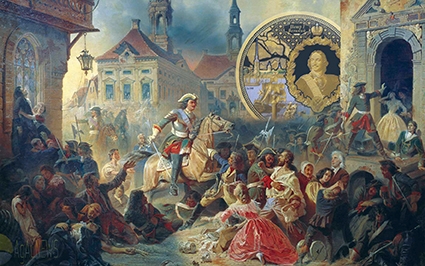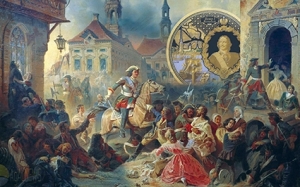Russia’s Perennial Quest for Modernization
From a geographic point of view, Russia has always been at the periphery of Europe. However, unlike Great Britain, yet another peripheral power to continental Europe, Russia was peripheral in many other ways beyond its pure geographic position. The further east one travelled from the Atlantic Ocean, the more backward the lands were in an economic sense. Russia has always faced this problem. Western Europe, due to its geographic position next to the Atlantic Ocean’s trade routes, played a pivotal role in industrialization, while Russia was largely cut off from this process in the 18th-19th centuries. The meagre industrialization level Russia had attained by the early 20th century was insufficient for building a powerful state.
However, Russia has always been keen to imitate European progress in technologies, economy and education. In fact, the Russians were far more successful at doing this than other peripheral states such as, for example, the Ottoman Empire. The Russians’ quest for development and ambition to reach the level of western Europeans was one of the central issues in Russian history. There is a certain cycle when a stagnation is followed by a rapid (sometimes revolutionary) attempt to catch up with the western states. Then, once a desired level is more or less reached, a period of stagnation begins while the Russians pride themselves on their past successes. Later on, however, stagnation leads to gradual understanding how backwards the power of the country has become and a new quest for quick development is sought.
The first example is when Peter I the Great in the late 17th century decided to take on European ship-building techniques, military technologies and ways of state management. This was a result of the Russians realizing that western Europe, based on progress made in the Age of Discoveries, stood supreme militarily and economically. The Russians in the 17th century could have allowed themselves to sit and enjoy their already great state, stretching from Moscow to almost the Pacific Ocean. However, the fact that the Russians were backwards in comparison to the neighboring Swedes and Poles led them to attain or imitate western European technologies and knowledge.
Throughout the 18th century, the Russian leaders enjoyed the military and economic successes achieved under Peter, and the empire grew, culminating in victory over Napoleon I in Russia in 1812. Then a stagnation took over as the Russian leaders, rather than thinking about further development, ignored what amazing results industrialization was giving in western Europe and already in Germany.
A military shock, defeat in the Crimean War (1853-1856), made the Russians realize the quick reforms needed to modernize the state. Then came Tsar Alexander II’s reign with deep structural reforms implemented in the government, army and social life. Russia’s successes in the Russo-Turkish War of 1877-1878 somehow put aside many fundamental inefficacies of the empire until another shocking moment. In 1904-1905, Japan defeated Russia in a war over influence in northern China and the Korean Peninsula. The Russians suddenly realized that they had become the first European state to be defeated by an Asian country.
In fact, the shock was so deep that the revolution of 1905 broke out. There was no time to carry out reforms as World War I was approaching and new military defeats, coupled with an inefficient economy, brought on the revolution of 1917.
Communism and in particular its initial phase, Stalin’s epoch, is arguably the best example of how this Russian cycle of stagnation/quick development works. Stalin and his clique modernized the country in the name of progress to attain and supersede the levels of western Europeans. He was doing what Peter I and Alexander II had done before him but to a much grander scale. Then, again, victory in World War II brought about a stagnation resulting in the backwardness of the Soviet Union’s economic and military capacities, and the eventual end of the Soviet state in 1991.
Modern Russia
With the chaotic period of the 1990s, followed by Putin’s long rule, he, like Peter, Alexander II and Stalin, is a man who has thought about progress. But his measures have not been intrinsically revolutionary to limit economic or government-management deficiencies. True that in the military realm, the Russians made huge progress, but structurally the country is still behind the west, and even east Europeans, as exemplified when oil prices fell. Moreover, since the reality of large-scale war is still pretty low, Russia’s actual influence in Eurasian affairs have diminished rather than increased. In Syria, Moscow is a winner, but the loss of Ukraine, Georgia and the Baltic states is a good example of the need to have more than just a powerful military arsenal.
Thus, in the long-term, Putin’s rule might be seen as a prelude to yet another understanding by the Russians that the country has fallen behind western Europe, which might bring about the urgent need for radical changes. In another scenario, if Putin’s rule is a revolutionary one, like Russia’s past reformers, then the level attained so far will certainly not be sufficient to bridge the gap between Europe and Russia.
By Emil Avdaliani
Peter the Great celebrated. Source: agaunews.com











